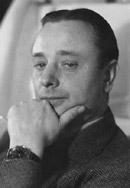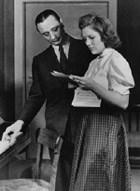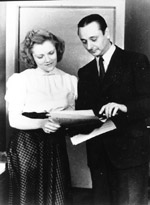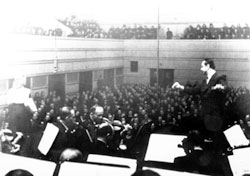
Stephan Pflicht:
The Gerhard-Winkler-Chronicle 1940
The Chianti-Lied
»Klänge aus
aller Welt« is completed with No. 13 Blütenfest
in Japan Ständchen
am Morgen
The following compositions also appear in print:
1941
Gerhard Winkler writes a slow waltz for the Swedish baritone Sven Olof Sandberg
Und
wieder geht ein schöner Tag zu Ende Doing his duty in military support Gerhard Winkler writes a choral piece, Heiliges Vaterland, to the words of Bruno Balz, a »Hymne für Fliegerstimmen und Militärmusik«, which is first performed under his direction by the soldiers and the music corps of the air base at Königsberg/Neumark. Gerhard Winkler's march
Unser
Kommandeur Gerhard Winkler's work for military support also involves the organisation of entertainment programs in which many well-known artists appear, including Käthe Heidersbach from the Berliner Staatsoper, Ilse Werner, Grethe Weiser, Kirsten Heiberg, Tatjana Sais, Lizzi Waldmüller, Theo Mackeben, Friedrich Schröder, Hilde Seipp, Erwin Bootz, Peter Schaeffers, Bruno Balz, Aldo von Pinelli, Klaus S. Richter, Claire Schlichting as well as Otto Stenzel with the Orchestra of the Berliner »Scala« and Willi Schaeffers with his Berliner »Kabarett der Komiker«. Hermann Frey, the Berlin
original who had written many texts for the composer Walter Kollo, wrote the
words for Gerhard Winkler's folksy song Im
Goldnen Löwen war's zu Sankt Goar Print editions also appear of his compositions:
1942 In May Gerhard Winkler meets 21 year old Magda Hain, who works for Siemens, sometimes appearing as hobby singer at small events and who sings for injured soldiers. The composer is so impressed by her unspoilt coloratura voice that he persuades her to try her luck as a professional singer and, together with Ralph Maria Siegel, writes a repertoire of songs especially for her. For a text by Günther Schwenn,
with whom he had worked before and with whom he was to work in friendly co-operation
for decades to come, Gerhard Winkler writes Mach
dir um mich doch bitte keine Sorgen (Ein Brief aus der Heimat)
Gerhard Winkler, who has by now been posted to Berlin where he works for the air force film, signs an exclusive contract with Magda Hain on 10th Ocober. In the same month he conducts
Magda Hain's first recording with Die
Vöglein im Prater On 20th December Magda Hain apears at a public concert in the large studio at Berliner Rundfunk, singing these songs conducted by the composer. She is a sensational success. The following compositions also appear in print :
1943-44
Magda Hain gives up her office job to have sufficient time for her singing career
and Gerhard Winkler writes the following songs for her Großmütterlein
Gerhard Winkler publishes
his song collection »Briefe des Herzens« with the three songs Mach
dir um mich doch bitte keine Sorgen (Ein Brief aus der Heimat) Gerhard Winkler goes on tour with Magda Hain for military support in France, Russia, Denmark, Finland and Norway. In January 1944 Gerhard
Winkler conducts Magda Hain's recording of the duos he composed for her with
words by Herbert Ernst Groh Wenn
die Geigen singen During the last year of war Gerhard Winkler works in program planning for the army broadcasting station in Berlin. The following compositions also appear in print :
1945 Gerhard Winkler witnesses the capture of Berlin from his home in Berlin-Wilmersdorf; Nassauische Straße 61. Soon afterwards he is working for Berliner Rundfunk in Masurenallee, under Soviet administration. He writes music for radio dramas and arrangements for the big orchestra of Berliner Rundfunk, conducted by Otto Dobrindt, occasionally conducting studio recordings and public performances himself.
As musical director Gerhard Winkler writes several numbers for the first night of the Berlin post-war cabaret »Tric-Trac« founded by the text writer Fritz Beckmann in the Astor cinema on the Kurfürstendamm, for example Wenn unsre Träume. This composition and also Die Sprache der Liebe, with words by Günther Schwenn appeared in the Peter Scheffer Musikverlag and belonged to the first music publications after the war Gerhard Winkler also works as free lance composer in Berlin, appears as pianist in American officers' clubs and composes the music for the comedy »Herzkönig« by Hemut Weiss, Curth Flatow supplying the song texts. Gerhard Winkler's songs Capri-Fischer and O mia bella Napoli are Nos. 17 and 18 in the 1945/46 hitparade . |
![]()
![]()
1906-1931|1932-1939|1940-1945|1946-1955|1956-1977
Homepage|Biographie|Songs|Contact|Links
The Gerhard Winkler Musikarchive|Fotos/Cartoons
|
Information given in connection with this homepage is for private use. All texts, pictures and music samples belong to the Gerhard-Winkler-Archive and any parties entrusted with the protection of these rights. Any public use requires prior written agreement with the Gerhard-Winkler-Archive and, if necessary, with the copyright holders (Rechteinhaber). |



